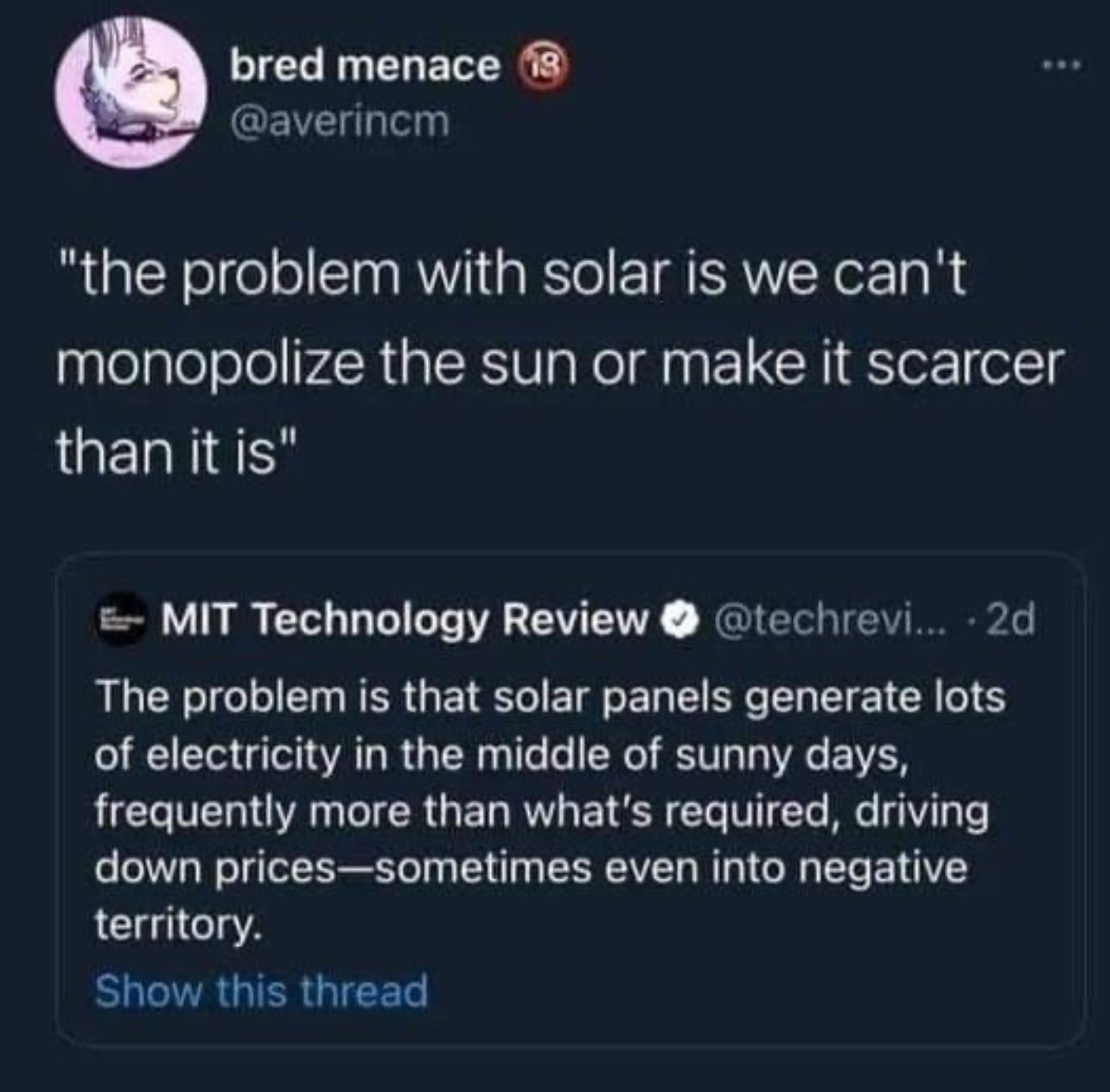this post was submitted on 02 Oct 2024
1691 points (95.6% liked)
Microblog Memes
6035 readers
2468 users here now
A place to share screenshots of Microblog posts, whether from Mastodon, tumblr, ~~Twitter~~ X, KBin, Threads or elsewhere.
Created as an evolution of White People Twitter and other tweet-capture subreddits.
Rules:
- Please put at least one word relevant to the post in the post title.
- Be nice.
- No advertising, brand promotion or guerilla marketing.
- Posters are encouraged to link to the toot or tweet etc in the description of posts.
Related communities:
founded 1 year ago
MODERATORS
you are viewing a single comment's thread
view the rest of the comments
view the rest of the comments

The "problem" of negative energy costs is easy to solve, but quite costly.
Build water desalination/carbon capture and storage/hydrogen generation plants that only run when the price goes below 0; even though these are very energy intensive, they would help stabilize the grid.
Then build more solar; you want to try to have the daytime price stay in the negative as often as possible.
The solution we're using instead of course, instead of all that environment crap you suggested, is running huge crypto farms only during the hours when the energy is in surplus.
To be fair; this is a valid use case.
If you are a solar power producer; rather than offering your energy at -ve rates; run a crypto farm when the output is too high. This is far better than running the same farm on coal.
But it would be better going into something useful.
I want to pre-empt the argument from the Bitcoin people that while this is a logically sound argument for how Bitcoin mining could potentially help the environment by making renewables more economically feasible, using this argument to describe Bitcoin mining electricity usage is completely invalid—Bitcoin mining as it exists today does not merely use excess renewable energy; it consumes energy even in times of demand when it could be given to residential, commercial, or industrial customers. Without the excess demand from today's Bitcoin mines, the capacity that is freed up can be used to close fossil fuel power plants.
To be clear, Bitcoin mining will never help the environment. There are ways to reduce it's negative effects though
CCS would be much better than bitcoin; even though CCS is very inefficient; if the power price is effectively -ve; that means that you are only paying maintenance costs to run your CCS
So if a large region (say europe, or USA + canada) is cloudy and without wind, then all transactions must stop and the remaining countries are susceptible to represent over 50% of the hashing capacity. A perfectly sound system I'm eager to see.
Basically opportunistic energy consumption.
That's not exactly conducive towards people building more solar.
The solar isn't the goal; the energy is enabling the value in other parts of the economy.
In fact; energy supply is so important to the reasonable functioning of the economy. It should be taken out of the profit driven cycle of business.
Look at what happened with WPI in Ohakune and PanPack when energy prices sky rocketed a few months back.
Even if our energy market wasn't profit driven, we would still have a shortage of energy, and either we would be burning up fossil fuels at an astonishing rate and a huge loss, or a number of heavy power users would be shutting down.
Price is one way we have to control demand, but if we didn't use it, we would need another system instead.